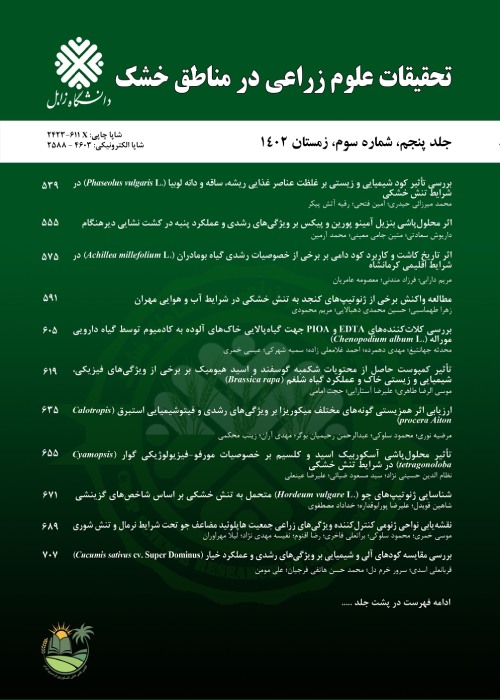Effect of application of salicylic acid and cocowet adjuvant on yield and yield components of maize (Zea mays L.) and nicosulfuron herbicide efficiency
Improving the efficiency of herbicides and reducing their consumption through the use of additives materials is one of the important strategies in sustainable weed management. Using reduced doses of herbicides with additives can reduce herbicide use, increase their effectiveness, and improve the health of food products. Therefore, this study investigated the effects of mixing herbicides with salicylic acid and cocowet adjuvant on corn yield, yield components, and weed control under Shahrood climate conditions.
A factorial experiment was conducted as randomized complete block design with three replications at the research field of Shahrood University of Technology. Factors included weed control method at four levels: control (no treatment), weeding throughout the growing season, recommended herbicide dose (nicosulfuron 2 L.ha-1) and reduced herbicide dose (nicosulfuron 1 L.ha-1) as the first factor, foliar application of salicylic acid and non-application of salicylic acid as the second factor, and cocowet in two levels, 2 liters per hectare and non-application of cocowet as the third factor. Treatments were performed at the 6-leaf stage. At the end of the season, corn traits were sampled and measured. The investigated traits included the number of rows per ear, the number of grains per row, the weight of 100 grains, the harvest index, grain, and biological yield, density and dry weight of broad and narrow leaf weeds.MSTATC software was used to conduct an analysis of variance (ANOVA) on all collected data. Significant differences between means correspond to a probability level of 0.05 according to the LSD test.
The minimum grain number per row (20.2), biological yield (1.326 kg/ha), and grain yield (2,544 kg/ha) were observed when salicylic acid was not applied in weed-free conditions. The highest harvest index of 33.91 percent was obtained by applying cocowet under weeding conditions, while the lowest harvest index of 14.62% was observed in the control group (without cocowet consumption and no-weeding). Salicylic acid foliar spraying in conjunction with weeding, 1 liter of herbicide, and 2 liters of herbicide resulted in harvest index increases of 28.5, 67.9, and 83.2% in comparison to the absence of salicylic acid. In addition, the results demonstrated that foliar application of salicylic acid under weeding conditions increased the biological and grain yield of maize by 12.5% and 44%, respectively, compared to non-application. In this regard, researchers reported that the interaction effects of salicylic acid and herbicide could reduce weed dry weight and increase maize grain and biological yield. The effects of salicylic acid on physiological and biochemical processes, such as photosynthesis, ion uptake, membrane permeability, enzyme activities, flowering, heat production, and plant growth and development, are well documented. Similar reductions in population and dry weight of narrow-leaved weeds were observed when reduced herbicide doses were combined with cocowet, according to the findings of the present study. Low doses of herbicide combined with cocowet increased the yield of corn by 14 percent. In this regard, researchers reported that nicosulfuron applied with petroleum and vegetable oil adjuvants enhanced weed control.
Based on the findings of this study, the use of salicylic acid can increase corn's growth and competitiveness against weeds, while cocowet adjuvant has the potential to reduce herbicide use by increasing herbicides' use efficiency.
- حق عضویت دریافتی صرف حمایت از نشریات عضو و نگهداری، تکمیل و توسعه مگیران میشود.
- پرداخت حق اشتراک و دانلود مقالات اجازه بازنشر آن در سایر رسانههای چاپی و دیجیتال را به کاربر نمیدهد.



